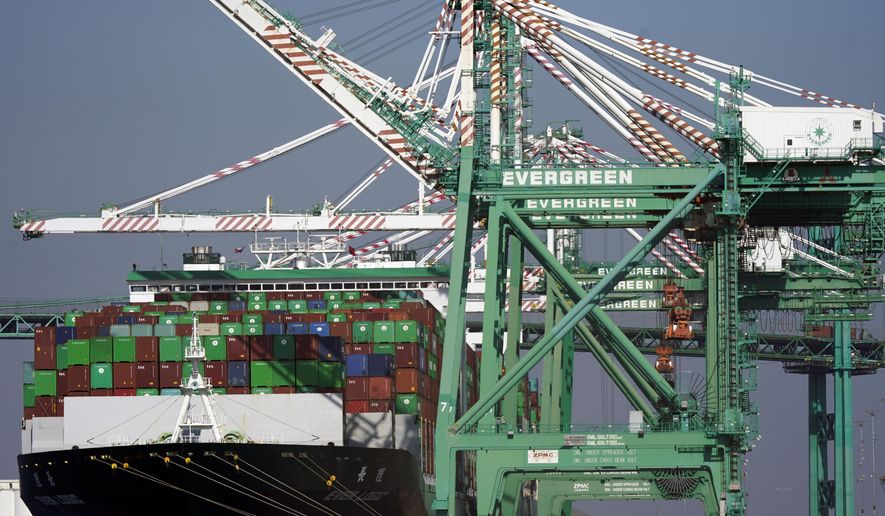House Republicans are backing legislation to deter unions from staging work slowdowns at the nation’s ports, warning the tactic could worsen the nation’s supply chain crisis.
Rep. Ted Budd, North Carolina Republican and a leader of the effort, says the bill is needed to prevent unionized dock workers from attempting to gain leverage during contract negotiations by paralyzing critical infrastructure, as happened in a bitter nine-month West Coast negotiating battle in 2014.
“At a time when our supply chains are already disrupted and causing economic pain to millions of Americans, we cannot allow big labor to take advantage of the situation and use unfair tactics to exacerbate the supply chain crisis and prevent much-needed modernization of port operations,” said Mr. Budd, who is running for an open Senate seat this year.
Republicans say that efforts to ease the supply chain crisis will be muted if labor unions are allowed to weaponize their power over the nation’s ports. Mr. Budd’s bill would make such job actions by maritime workers an unfair labor practice under the National Labor Relations Act.
The change would allow port managers to seek federal intervention in labor disputes, expediting the process for arbitration and resolution. In special circumstances, the National Labor Relations Board could even step in and block the heavy-handed union maneuvers.
Apart from Mr. Budd, the bill is being championed by Sen. James Risch of Idaho, the top Republican on the Senate Foreign Relations Committee. Supporters say that, at a time of soaring inflation rates, American consumers cannot afford further supply chain issues that are only likely to put additional pressure on consumer goods prices.
“Government should be making it as easy as possible to transport everyday goods that people need — especially as prices continue to skyrocket and shelves remain empty,” said Sen. Rick Scott, Florida Republican, who is backing the bill in the Senate.
The legislation comes as more than 22,000 union dockworkers across 29 ports along the West Coast are set to enter into contract negotiations this summer. The workers, affiliated with the International Longshore and Warehouse Union, have a long history of slowing down the pace of work to extract concessions from port managers during the negotiations process.
In 2014, the last time the union’s contract was up for negotiation, more than 14,000 union dock workers engaged in slowdowns across the West Coast. In Southern California alone, the tactic delayed docking for nearly 30 cargo ships for weeks. An estimate by the Pacific Maritime Association contended that imports across the West Coast dropped 11% during that period.
The result was billions of dollars in lost business productivity and profit. The Washington Council on International Trade estimates that the state’s business lost more than $777 million because of the slowdown, including $70 million in wasted fruit alone.
“This practice was unfair and dangerous, having immediate effects on … businesses,” said Sen. Mike Crapo of Idaho, the top Republican on the Senate Finance Committee.
Critics note that the hardball tactics came despite its union longshoreman already being among the highest-paid blue-collar workers in America. Workers in the profession routinely make more than $100,000 a year alongside pension benefits and guaranteed hours. Even entry-level positions have a starting rate of between $30 and $50 an hour.
• Haris Alic can be reached at halic@washingtontimes.com.




Please read our comment policy before commenting.